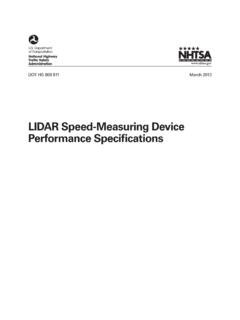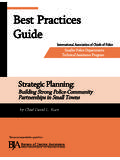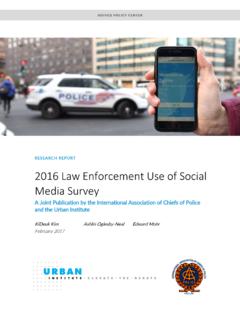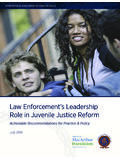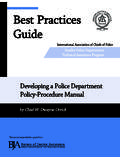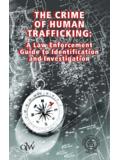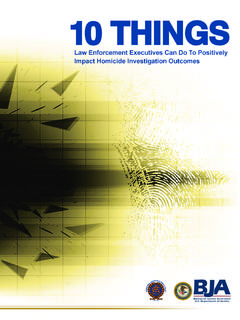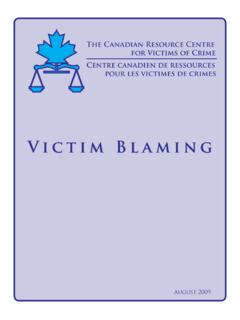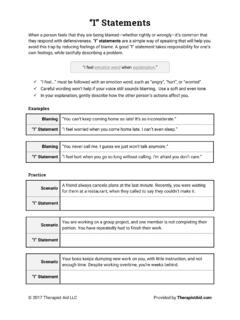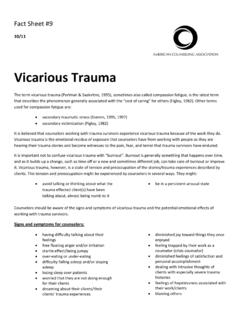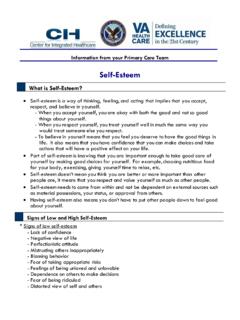Transcription of Successful Trauma Informed Victim Interviewing
1 Successful Trauma Informed Victim Interviewing When gathering evidence during the investigation of sexual assault crimes, it is necessary for law enforcement and others in the criminal justice system, such as prosecutors, to ask the Victim questions that they may find difficult to answer, in order to establish the facts and circumstances of a reported crime. To build rapport and trust with victims when starting the interview, it is effective for law enforcement to acknowledge that some of the questions might seem unusual and to explain that all of the questions serve to help the interviewer understand the Victim s experience of the event. Victims should also be encouraged to ask questions at the beginning and throughout if they need clarification regarding the process or the purpose of interview The phrasing of questions during Victim interviews is important.
2 Depending on how a question is asked, it might be perceived by a Victim as blaming them for their actions, or for what they may be unable to recall. The following examples demonstrate how Trauma - Informed interview techniques can be used to reframe these questions in a manner that helps victims retrieve memories from a traumatic event and assists law enforcement in gathering more information while making the Victim feel more supported and increasing the likelihood that they stay involved in the criminal justice process. Beginning with questions such as Where would you like to start? or Would you tell me what you are able to about your experience? sets a supportive tone for the interview. Asking questions in this way also invites the Victim to describe what happened, their thoughts, and their feelings in their own words, which is valuable evidence to document in the case report.
3 In general, law enforcement should consider reframing questions that start with why ; directives such as explain to ; and requests for a chronological account with prompts such as and then what happened? Using open-ended questions and requests when possible gives the person being interviewed the opportunity to share more information about what they are able to recall. For victims, this method helps their brain retrieve information from a traumatic event and offers them more control as they recount a time when they were violated and had no control. This document should be used in conjunction with IACP s Sexual Assault Guidelines and Investigative Strategies, Sexual Assault Supplemental Report Form, Sexual Assault Report Review Checklist, Sexual Assault Policy and Training Content Guidelines, and Model Policy on Investigating Sexual Assaults (Members Only).
4 Interview Questions to Avoid Trauma - Informed Reframing Rationale Why did or Why didn t When (specific event happened), what were your feelings and thoughts? or Are you able to tell more about what happened The original questions are asking for clarification of what happened, which could be perceived as faulting the Victim for taking or not taking a certain action. Asking a Victim about their thought process provides an opportunity for them to explain what they did or did not do and why. The use of Are you able reduces the pressure on the Victim to fully articulate what they did and why they did or did not act in a certain way. When experiencing Trauma , victims do not consciously choose their reactions or what they are able to remember, the survival part of the brain takes over and victims might not understand why they reacted the way that they did.
5 When asking about thought processes, the question should be tied to a specific event, such as, When he locked the door, how did that make you feel? Start at the beginning and tell me what happened. or How long did the assault last? and Other questions asking for a chronological account. Where would you like to start? or Would you tell me what you are able to remember about your experience? or What are you able to tell me about what was happening before/during/after the assault? or If anything, what do you remember hearing during the event? The original question may be difficult for the Victim to answer because experiencing a traumatic event can impact the storage of memories, which may make it difficult for the Victim to remember the length of time that the assault lasted or the chronological order of events.
6 Asking the Victim to state the exact timeframe/timeline may increase the confusion and self-blame they experience. As a result, they may come up with their best estimate of a timeframe that may become problematic afterward. Reframing the questions and opening with What are you able can reduce the pressure on the Victim to recall specifics given the impact of Trauma on memory. Additionally, asking sensory-based questions can lead to additional evidence that can help law enforcement to begin building a timeline and placing events in chronological order ( , hearing the suspect s phone ring during the assault can give investigators a timeline when compared to the suspect s phone records).
7 Interview Questions to Avoid Trauma - Informed Reframing Rationale What were you wearing? Sometimes we can get valuable evidence from the clothes you were wearing, even if you ve put them through the laundry. We would like to collect the clothes you were wearing at the time of the assault as evidence. Can we pick up those items at a time and place that is convenient for you? The original question could be perceived as blaming the Victim for the assault due to their attire, , that the suspect chose Victim because of what they were wearing. Explaining that gathering clothing, sheets, towels, etc., is part of the evidence collection process removes the Victim s specific experience from the equation and instead focuses on the process.
8 Were you drinking or taking drugs? Can you tell us if you had been drinking or taking drugs at the time of the assault? We are not investigating your drinking/drug use. We are concerned for your safety and about what happened to you. This helps us to establish an element of the crime and get a better picture of what was happening during the assault and provide you with additional support. The original question could be perceived as implying that what happened to the Victim happened to them because they were drinking alcohol or taking drugs. Additionally, victims may be afraid that there will be ramifications, possibly criminal, for their actions and so hesitate to admit it to law enforcement, especially if they are underage and/or the drug use was illegal.
9 The use of drugs and/or alcohol can also greatly increase the Victim s experiencing of self-blame, guilt, and shame. It is recommended that law enforcement communicate to the Victim that any voluntary consumption of drugs or alcohol does not justify a sexual assault. Why did you go with the suspect? or Do you think you led them on? or Do you think you contributed to this happening? Can you describe what you were thinking and feeling when you went with the suspect? and Did the suspect s behavior change after you went with them? How did this make you feel? The original questions could be perceived as blaming the Victim for choosing to go with the suspect or implying that it was a consensual encounter because the Victim initially engaged with the suspect.
10 Reframing the question clarifies the Victim s decision-making process without judgement or blame. These questions also set the stage for asking about what the suspect did, how the suspect s actions and demeanor may have changed, and how this may have made the Victim feel threatened, afraid, or helpless. Information from this question can assist in identifying the suspect s tactics, approaches, and strategies as well. Interview Questions to Avoid Trauma - Informed Reframing Rationale Why were you out at this time and at this location? What are you able to tell me about what brought you to the location at this time/day? The original question could be perceived as blaming the Victim for being in a place where they could be assaulted.

